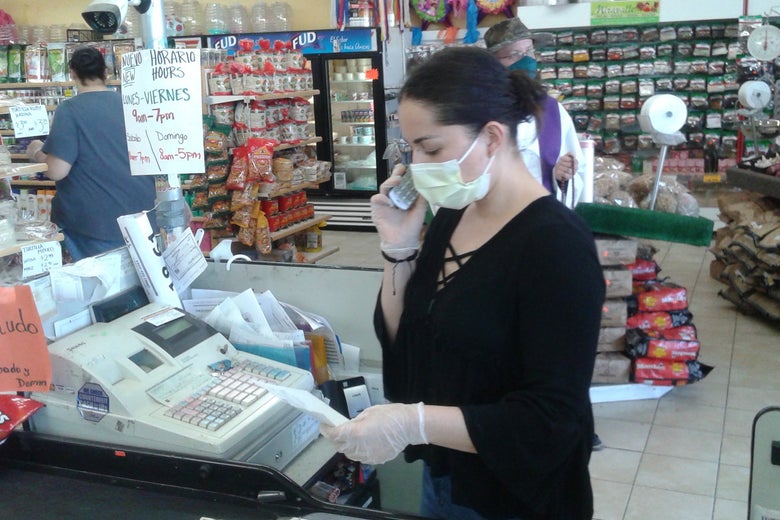
Johanna Ramirez works in her grocery store in Fort Lupton, Colorado, on Thursday.
Keith Coffman/Reuters
Slate is making its coronavirus coverage free for all readers. Subscribe to support our journalism. Start your free trial.
On this week’s episode of Amicus, Dahlia Lithwick spoke with Colorado Attorney General Phil Weiser about how states’ rights are coming into play during the coronavirus pandemic. A portion of their conversation, which has been edited and condensed for clarity, has been transcribed below.
Dahlia Lithwick: Let’s start with the basics. You are on the front lines trying to be the attorney general in the midst of a developing crisis/conversation about states’ rights and governors’ responsibilities and the line between states and the federal government. Has this changed your job or has it always been some version of this?
Phil Weiser: We’re in a different world with Donald Trump as president. States are more important than ever. I stepped up to serve knowing that federalism was front and center. Now in COVID, we are seeing this on steroids because the federal government’s lack of leadership here is such a point of pain. States are bidding against each other for PPE and ventilators because we don’t have national leadership. One of the things the national government can do is coordinate among states, and that isn’t happening, leaving states to fend for ourselves.
Another issue that’s coming down the pike is consumers who are distressed in the economic fallout that’s coming in the wake of the public health crisis. Here too, we have to both pick up the slack that the feds might not be doing, and in some cases, sue the feds for their failure to do their job.
Can you give us your CliffsNotes on the 10th Amendment, on federalism, and how you would help delineate the line between state and federal prerogatives in a pandemic?
States have an independent, sovereign role to the people of their state. This is why Bill Barr can’t order any state governor to decide when to end a public health emergency. The states have that authority. It’s the police power of the state. Whatever the state’s going to do, the state governor and the state legislature need to be accountable for it.
“The states have been fending for themselves.” — Phil Weiser
The feds can provide support and say, “Here, we’ll give you money for a ventilator and you can’t use that money to buy guns for your police forces,” but the federal government can’t say, “Oh, we have this program that we used to give you money for your police forces, and if you don’t want to open up tomorrow, we’re taking away all this money.” That’s coercion, and that goes against the whole concept of federalism, which leaves the states with an independent sphere to operate.
In a perfect world, you’re right, states have vast constitutional authority to regulate health and welfare in the state, but we also do have a long, long history of the national government involving itself in health policy, right? If we had a functioning Congress that wanted to be responsible in this pandemic, there are a lot of things that Congress could be doing. It’s not the case that this is solely the authority of the states, right?
That’s right. The federal government, in a perfect world, would have been ramping up and building up testing capacity in January, February, knowing this was coming, and would have said to every state, “We have all this testing capacity. We are going to provide it to you.” That would be an extraordinarily valuable role the federal government could play. It hasn’t played that here. The states have been fending for themselves on testing, among other areas.
Why haven’t we seen a massive authoritarian power grab from this administration? It has to be the case that federalism in this moment is one of the biggest checks against a really authoritarian power grab.
You have put your finger on it and this is something that the founders appreciated. They were terrified of concentrated power. They studied King George and wanted to ask the question, “How can we create a government that diffuses power and protects liberty?” States having the independent authority that we have is absolutely a protection of liberty. It’s a protection also of sound governance.
If we did only have a national government right now, this pandemic would be much worse because the states have been the ones in the lead, which is why people are talking about governors, whether it’s Mike DeWine in Ohio, Andrew Cuomo in New York, or others. That has filled a vacuum. The federal government leadership is most effective when it can be out ahead of issues and it can be led by a competent administration. That’s why during the New Deal, FDR was able to have such a national impact because it was competent and it was doing things, but if the federal government is not doing things, if it’s purely reactive behind the curve, chaotic, then the states have to fill the void.
Listen to this episode, in which Weiser also discusses cooperative federalism, vote by mail, and the faithless electors case, below, or subscribe to the show on Apple Podcasts, Overcast, Spotify, Stitcher, Google Play, or wherever you get your podcasts.
from Slate Magazine https://ift.tt/35aYouA
via IFTTT
沒有留言:
張貼留言